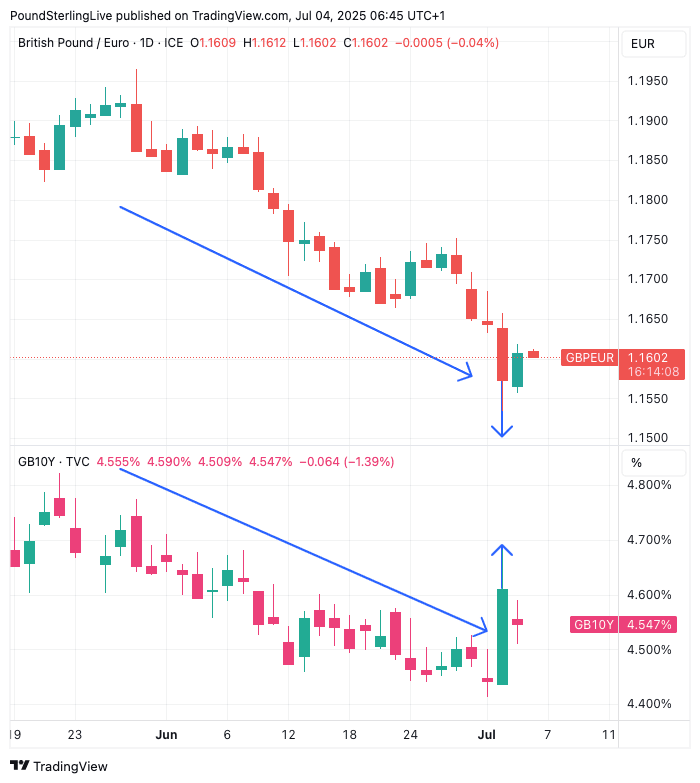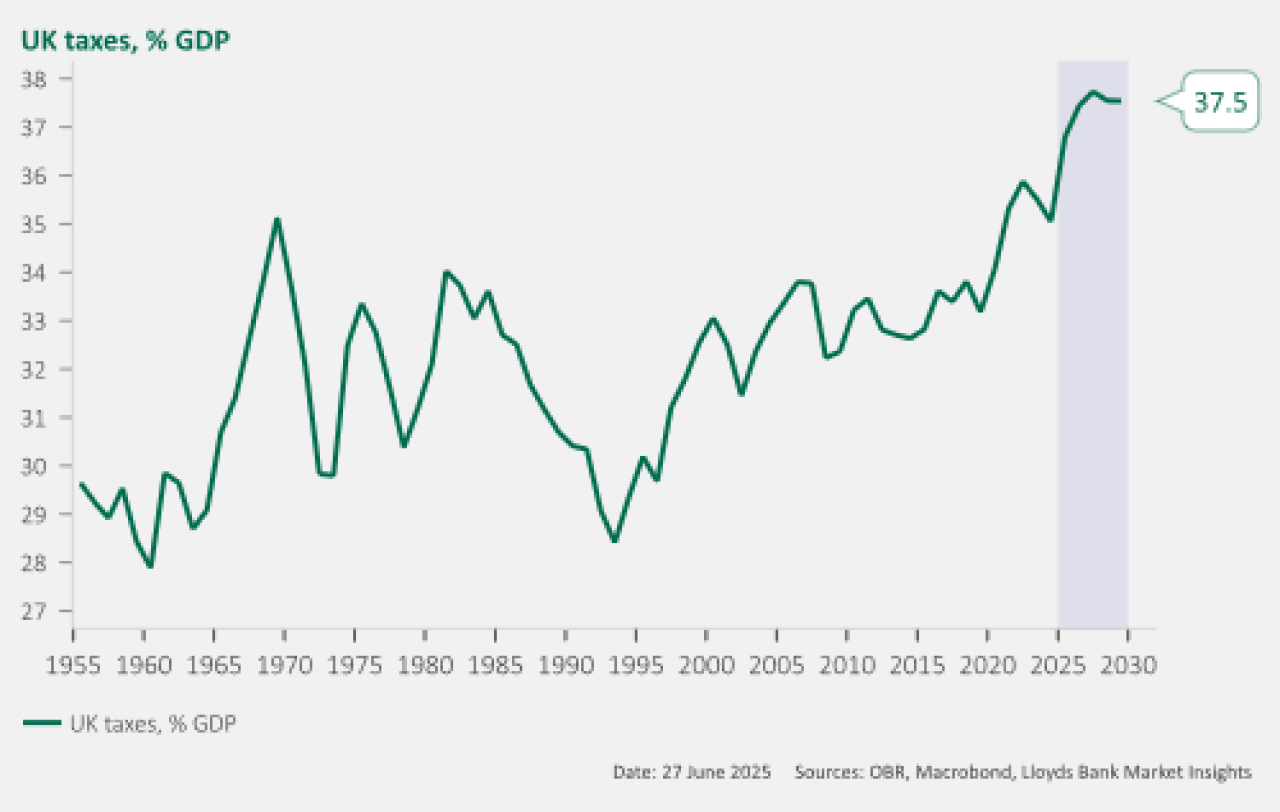- GBP steadies as Prime Minister backs his Chancellor
- Markets have imposed their discipline
- Reeves opens the door to tax rises
- A fiscal crisis continues to brew in the UK

All smiles again. Reeves and Starmer do the rounds on Thursday, 24 hours after the fiasco in Parliament. Picture by Lauren Hurley / No 10 Downing Street.
The British Pound has survived the storm, but we're in the fiscal Hurricane season.
Pound Sterling exchange rates and UK government bonds - gilts - have levelled off near recent lows after Prime Minister Keir Starmer said Chancellor Rachel Reeves is safe in her post for "many years".
"The passing of the storm gives the pound a lift. The magnitude of the moves highlights the sensitivity to fiscal arithmetic and will not dent speculation that the government will have to raise taxes in the autumn to avoid higher borrowing," says Kenneth Broux, a strategist at Société Générale.
Starmer's failure to back Reeves during his weekly showdown in Parliament with opposition leader Kemi Badenoch triggered market fears that a replacement would be sought from the left of this already left-wing government.
Chastised by the political and financial market fallout, Starmer has little choice but to back his Chancellor.
"This has been a reminder the market is the real disciplinarian," says Citibank in a currency market commentary note. "GBP markets are recovering from Wednesday's rout after Chancellor Reeves assures commitment to fiscal rules and PM Starmer confirmed that Reeves will stay on."

Above: GBP/EUR and ten-year gilt yields tend to move in tandem with (big blue lines). But when fiscal stress events happen that relationship breaks down and yields jump while the GBP slumps.
The sight of Reeves crying at Starmer's side on Wednesday sent markets into a spin: yields and the pound fell in tandem, signalling a distinct UK-centric fear that the country's debt dynamics were becoming unsustainable.
We saw similar signs of nervousness in January when markets responded to signs that the economy was slowing down under the weight of the tax increases announced by Reeves in late 2024. Most famously, though, bonds and the pound fell in tandem during Liz Truss' short-lived tenure, where she expanded spending to subsidise energy bills while also proposing to slash taxes.
As Chancellor, Reeves should be a face of calm that embodies fiscal stability; her obvious emotional discomfort - whatever the cause - shook markets.
The UK already pays a premium to other major developed countries to borrow money, which means it is already held to be a more vulnerable prospect to lend to. The rise in UK bond yields over the past 24 hours suggests that premium is building.
To bring that premium down, and put the UK's fiscal trajectory on a stable footing, Reeves must deliver a credible budget this Autumn.
She should make significant cuts to welfare spending, which are at the heart of the UK's fiscal woes. However, the Labour Party has shown it has no will to get a grip on this expenditure.
"The significant conclusion from this episode is that it has shifted the power from Downing Street to the backbenches and those MPs have demonstrated that they won’t vote for spending cuts. That narrows the government’s options for designing an Autumn Budget," says a note from Lloyds Bank.
This means Reeves will have little choice but to raise taxes in the Autumn. The risk is that tax changes trigger another economic slowdown, depriving the Chancellor of the growth she requires to boost the overall tax take.

Above: Taxes are at post-war highs, and will continue rising.
This week saw the Prime Minister abandon efforts to cut welfare spending, meaning the Chancellor will have to find between £5BN and £10BN in additional borrowing or taxes in her next budget.
Speaking on Thursday, Reeves opened the door to tax rises, saying "of course there is a cost to the welfare changes that parliament voted through this week and that will be reflected in the budget."
"Price action makes it even more likely that fiscal restraint (via higher taxes) will follow in the autumn, the next major fiscal event. Our economist notes the next challenge will be whether or not to address party demands to scrap the two-child benefit cap," says Citibank.
The Pound will wait for the next episode of UK fiscal concerns, and Reeves, secure in her position for now, will hope no unexpected shocks will come knocking on the door of Number 11 Downing Street.
This storm has passed, but the unsettled fiscal climate means more are likely to blow in on Autumn winds.
"In recent months, we have growth less constructive on Sterling’s prospects on European crosses," says a note from Goldman Sachs. "This is particularly true over longer horizons, on account of our economists’ out-of-consensus call for sequential BoE cuts from the August meeting, a challenging long-term valuation picture, and lingering fiscal risks."

